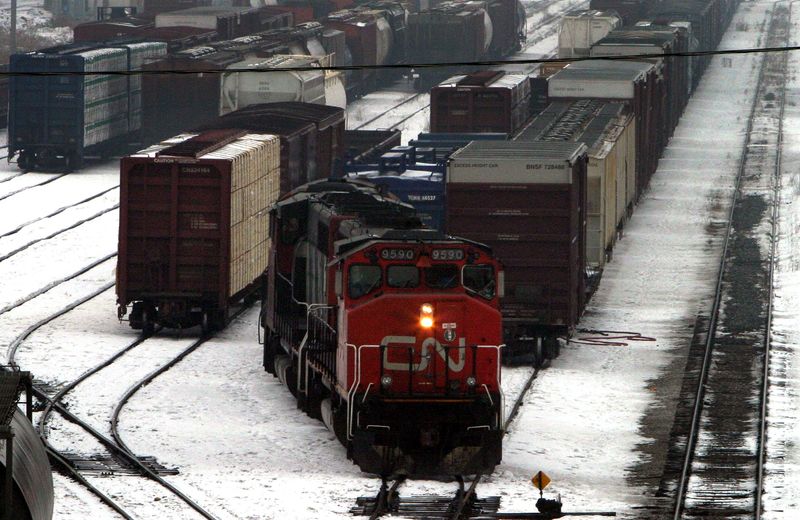By David Ljunggren
OTTAWA (Reuters) -For the first time, Canada's two main railway companies - Canadian National Railway (TSX:CNR) and Canadian Pacific (NYSE:CP) Kansas City - are on the verge of a simultaneous labor stoppage that could inflict billions of dollars' worth of economic damage.
WHY ARE BOTH COMPANIES POISED TO STOP?
Contract talks between the Teamsters union and the companies usually take place a year apart, but in 2022, after the federal government introduced new rules on fatigue, CN requested a year-long extension to its existing deal rather than negotiate a new one.
This meant both companies' labor agreements expired at the end of 2023 and talks have been ongoing since. As a result, for the first time the failure of negotiations would halt the vast majority of the Canadian freight rail system.
The Teamsters represent around 10,000 members who work as locomotive engineers, conductors, train and yard workers and rail traffic controllers at the two companies in Canada.
WHAT IS LIKELY TO HAPPEN NEXT?
CN Rail and CPKC (TSX:CP) both say they will start locking out workers in the early hours of Thursday if they cannot reach a deal. The union has issued a strike notice to CPKC which would also take effect early on Thursday.
CPKC, created in 2023 through a merger of Canadian Pacific and Kansas City Southern (NYSE:KSU), has a U.S. and Mexican network which it says will operate normally. CN also says trains on its U.S. network will run.
That said, a stoppage will still lead to shipment disruptions south of the border. Both rail operators and some of their U.S. competitors have begun to refuse certain cross-border cargoes that would rely on the CN and CPKC networks.
CPKC has said it would halt new rail shipments originating in Canada, and new U.S. shipments destined for Canada starting Aug. 20, if talks fail to progress.
The railways move grain, autos, coal and potash, among other shipments.
WHAT ARE THE SIDES ARGUING ABOUT?
The union says CPKC wants "to gut the collective agreement of all safety-critical fatigue provisions", meaning crews will be forced to stay awake longer, boosting the risk of accidents.
CPKC says its offer maintains the status quo for all work rules, "fully complies with new regulatory requirements for rest and does not in any way compromise safety."
The Teamsters say CN wants to implement a forced relocation provision, which would see workers ordered to move across Canada for months at a time to fill labor shortages.
CN says it has made four offers this year on wages, rest, and labor availability while remaining fully compliant with government-mandated rules overseeing duty and rest periods.
WHAT CAN THE FEDERAL GOVERNMENT DO?
Under article 107 of the federal labor code, Labour Minister Steven MacKinnon has broad powers and can order the sides to enter binding arbitration. In 2023, his predecessor, Seamus O'Regan, issued such an order to end a dockworkers strike in British Columbia. In that case, unlike the current rail dispute, the sides had largely agreed on the outlines of a deal.
MacKinnon rejected a request last week by CN for binding arbitration, urging the sides instead to put in more effort at the negotiating table. In a separate statement issued on Monday, he urged the companies and union to put in the tough work needed to reach a deal.
WHAT HAPPENS IF THE UNION STRIKES?

Talk of the government acting to end a strike is moot, given that both companies have made clear they will lock out workers.
In case of a strike, the government can introduce back-to-work legislation forcing union workers to return to their jobs. The previous federal Conservative government did that in 2012 to end a walkout by Canadian Pacific workers.
